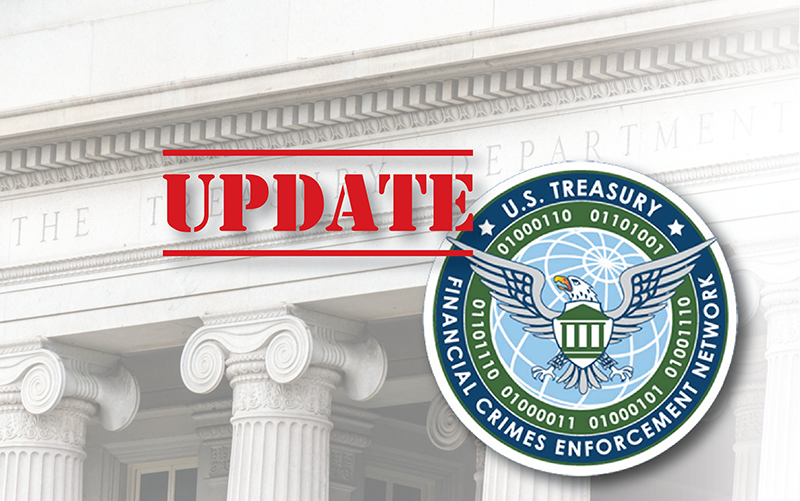Banking and Business Monthly – March 2023
SCOTUS Limits Penalties for Non-Willful Failures to File FBARs

On February 28, 2023, the Supreme Court of the United States (SCOTUS) decided Bittner v. United States, resolving a circuit split concerning the Financial Crimes Enforcement Network (FinCEN) reporting of certain foreign bank and financial accounts under the Bank Secrecy Act (BSA). At issue was the extent of penalties for non-willful violations of the BSA’s recordkeeping and reporting requirements on FinCEN Form 114, Report of Foreign Bank and Financial Accounts, also known as an FBAR. By a narrow 5-4 majority, SCOTUS handed a taxpayer victory to U.S. residents who “non-willfully” violate the BSA’s reporting requirements, holding that the penalty for a non-willful violation of the reporting requirements is to be assessed on a per-form basis rather than a per-account basis.
BSA Reporting Requirements
The BSA requires “U.S. persons” to annually file an FBAR to report all financial interests in, or signature or other authority over, financial accounts located outside the country (with certain exceptions) if the aggregate value of the accounts exceeds $10,000 at any time during the calendar year. The term “U.S. person” includes a citizen, resident, corporation, partnership, limited liability company, trust, or estate. U.S. persons with fewer than 25 accounts in a given year must provide details about each. However, if a U.S. person has either a financial interest in or signature or other authority over 25 or more accounts, the filer needs to only check a box and state the number of accounts in each category. FBARs generally are due on April 15, with an automatic extension to October 15 if the April deadline is not met. Under the BSA, a willful violation of the requirement is subject to a civil penalty up to the greater of $100,000 or 50% of the balance of the account at issue. Nonwillful violations result in a penalty of up to $10,000 (with an exception for reasonable cause). Criminal penalties also may be imposed.
Bittner’s Facts
Alexandru Bittner, a dual citizen of Romania and the United States, testified that he learned of the reporting obligations after returning to the United States in 2011. Bittner subsequently submitted the required annual FBARs for 2007 through 2011. The IRS deemed his FBARs deficient because they did not include all of the relevant accounts. Bittner then filed corrected reports with information for each of his accounts. Although the IRS did not contest the accuracy of the new filings or find that his previous errors were willful, it determined the penalty was $2.72 million — $10,000 for each of 272 accounts reported in five FBARs. Bittner successfully challenged the penalty in U.S. District Court in Texas, but on appeal, the Fifth Circuit reversed and upheld the penalty assessment. Since the Fifth Circuit decision conflicted with a Ninth Circuit decision in a similar case, SCOTUS took the case to resolve the circuit split.
SCOTUS Majority Opinion
SCOTUS agreed with Bittner’s interpretation of the BSA’s penalty provision for non-willful FBAR violations, holding that the civil penalty should be assessed on a form basis, thereby reducing Bittner’s penalty from $2.72 million to $50,000, or $10,000 for each year of failed reporting. The Court reasoned that 31 USC §5314 “does not speak of accounts or their number” and instead the “relevant legal duty is the duty to file reports.” The Court explained that the duty to file such reports attaches regardless of the number of accounts a person has. In other words, the duty to file is binary -- one either is or is not required to file a report. Furthermore, the Court continued, 31 USC §5321 imposes a civil penalty on a violation of 31 USC §5314, and because 31 USC §5314 is violated when a person fails to accurately file a report, the civil penalties accrue on a per-report, not a per-account, basis. The Court further reasoned that although Congress had explicitly authorized per-account penalties for some willful violations, and the reasonable cause exception to non-willful violations explicitly refers to accounts, that does not mean that non-willful violations accrue on a per-account basis. Instead, the Court determined that the fact that Congress expressly referenced account information in the other sections makes the absence of such per-account language in the provision on non-willful violations meaningful. Put another way, Congress knows how to tie penalties to account-level information if that was its intent.
Implications
The Court’s decision brings much needed clarity on this issue, which created a circuit-split. As highlighted by Bittner’s situation, the potential penalties on a per-account basis could be vastly greater than those on a per-form basis. This decision significantly reduces taxpayers’ potential financial exposure for non-willful violations of the FBAR reporting requirements down to $10,000 per year for the filed report. It is also important to note that SCOTUS’ ruling applies only to non-willful failures to file. The penalties for violations that are knowing, intentional, reckless, or due to willful blindness are not subject to the per-report limit and may be assessed on a per-account basis, which could be a significant sum. For further inquiries or questions, please contact me at smigala@lavellelaw.com or (847) 705-7555.
More News & Resources
Lavelle Law News and Events










STAY UP TO DATE
Subscribe to our newsletter
Lavelle Law, Ltd. | All Rights Reserved |
Created by Olive + Ash.
Managed by Olive Street Design.


